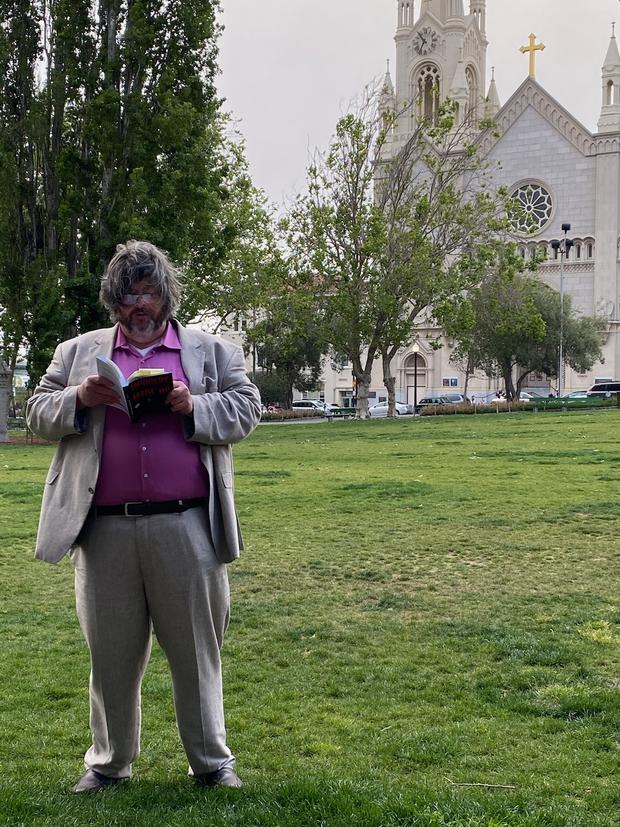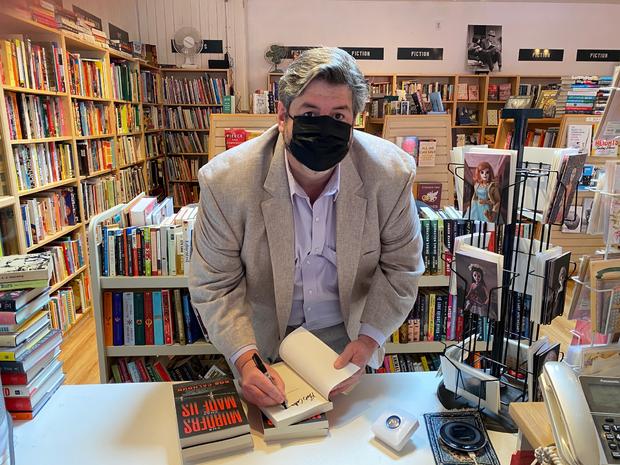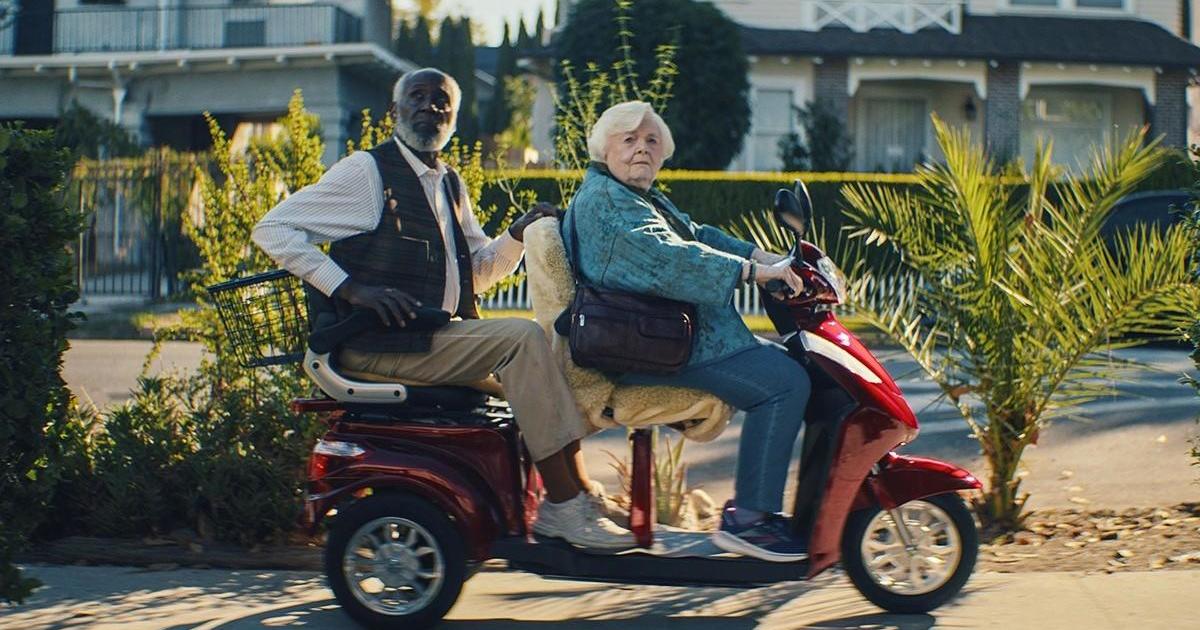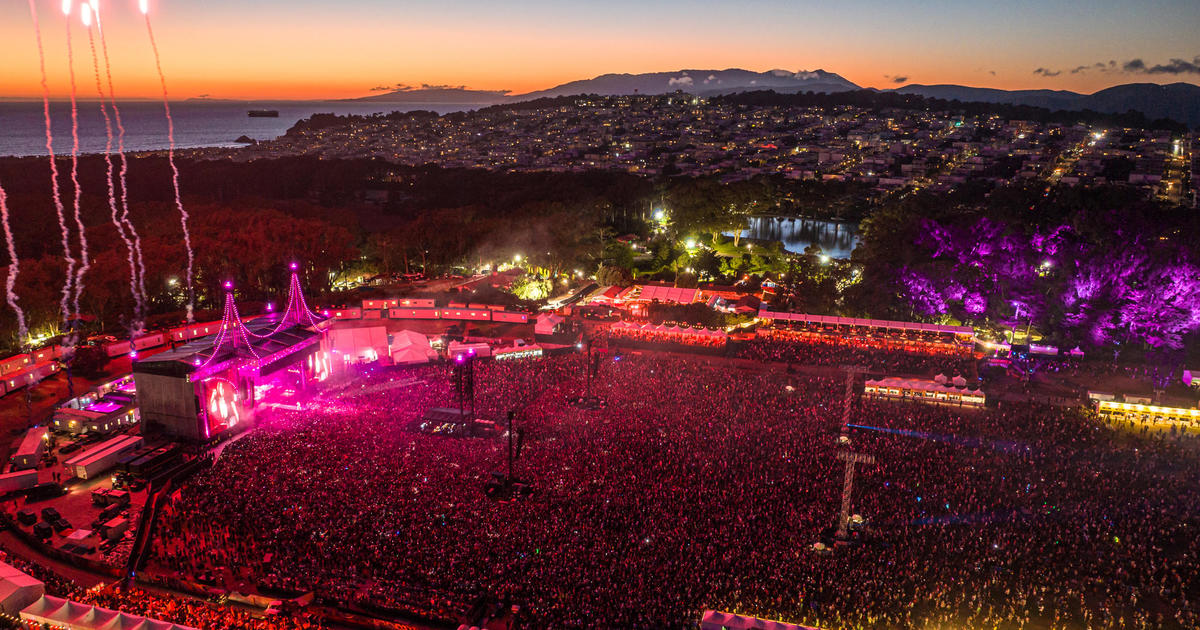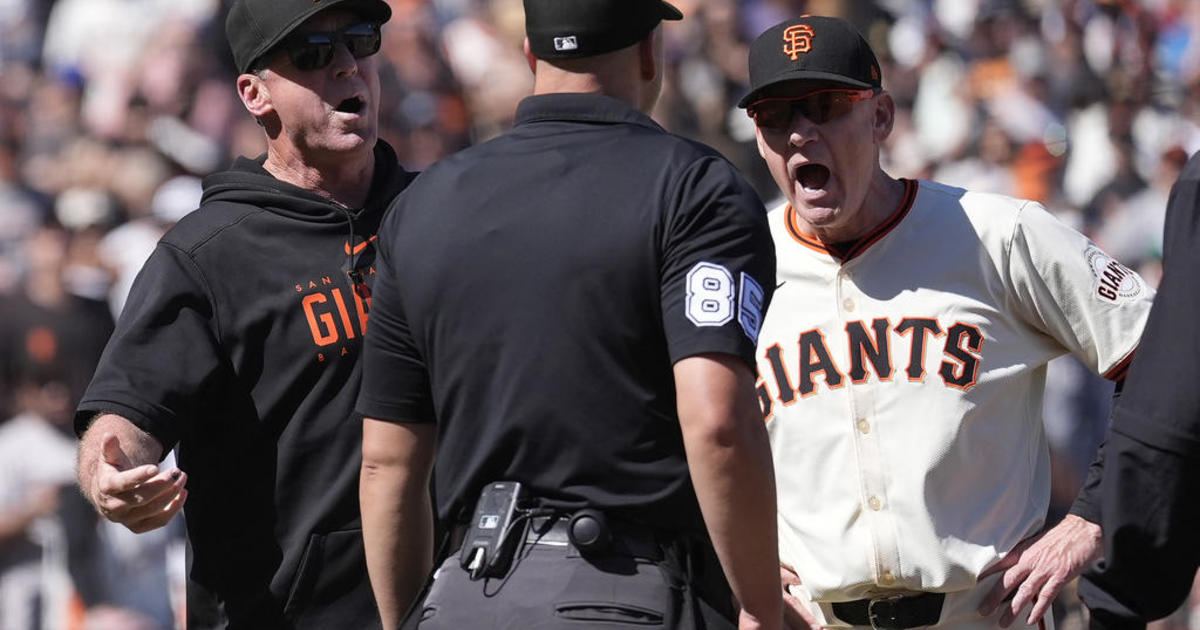CBS SF Talks to 'The Murders That Made Us' Author Bob Calhoun
By Dave Pehling
SAN FRANCISCO (CBS SF) -- While he is now better known locally as a writer and journalist, Bay Area figure Bob Calhoun has led a uniquely varied artistic career as part of San Francisco's underground scene. Starting in the '90s, he regularly played local punk clubs under his stage name Count Dante with his band, the Black Dragon Fighting Society.
Taking his and the band's name from comic book ads he had seen of a shadowy and somewhat notorious Midwestern karate sensei from the '60s, Calhoun created a persona that was part martial arts master, part late-night infomercial huckster, part motivational speaker and all punk-rock outrageousness.
The band's theatrics and Calhoun's outsized onstage personality -- imparting eye-gouging martial art techniques and secrets to financial success during between-song banter while clad in a leopard-print kimono -- naturally led Calhoun to becoming involved with one of the San Francisco punk scene's wildest exports: Incredibly Strange Wrestling.
Drawing on his own well of wrestling knowledge -- he would ghostwrite Gene LeBell's memoir The Godfather of Grappling in 2005 -- Calhoun ably filled the role of ISW commentator, referee and wrestler as Dante the Baptist aka The Christian over the course of a seven-year involvement with the enterprise that managed to combine the energy of punk rock with the energy of high-flying Mexican lucha libre wrestling and low-brow, high-concept squared circle shenanigans.
Calhoun would document his experiences in his entertaining memoir, Beer, Blood and Cornmeal: Seven Years of Incredibly Strange Wrestling that was published by ECW Press in 2008. His writing resume would grow as a regular contributor to such outlets Salon.com, RogerEbert.com, Gawker and both the SF Weekly and the San Francisco Chronicle, covering film, music, pop culture and Bay Area history.
His next book, Shattering Conventions: Commerce, Cosplay and Conflict on the Expo Floor in 2013, looked at the sometimes oddball world of the convention and tradeshow industry with Calhoun providing a first-hand account of his exploits infiltrating that world. The book spawned a web series that documented some of Calhoun's gonzo reporting for 'Meetings Today.'
Calhoun would find inspiration for his next book after he was commissioned to write an online true crime column for the SF Weekly's website. Documenting an array of homicides and other misdeeds and malfeasance committed in the Bay Area dating back to San Francisco's 1849 Gold Rush boom, his stories for "Yesterday's Crimes" explored the central place many of these transgressions held in the city's history.
Compiling and augmenting the stories collected in the column, The Murders That Made Us: How Vigilantes, Hoodlums, Mob Bosses, Serial Killers, and Cult Leaders Built the San Francisco Bay Area was published by ECW Press last spring. The book may be Calhoun's most entertaining collection yet, giving readers a sometimes gruesome but always engaging, black-humored look at the San Francisco Bay Area's lurid underbelly.
Calhoun is reading from his book at a upcoming spoken-word gig at the Make-Out Room in San Francisco's Mission District on Thursday, Aug. 5. He will be appearing with a pair of notable writers who are equally renowned for their musical exploits.
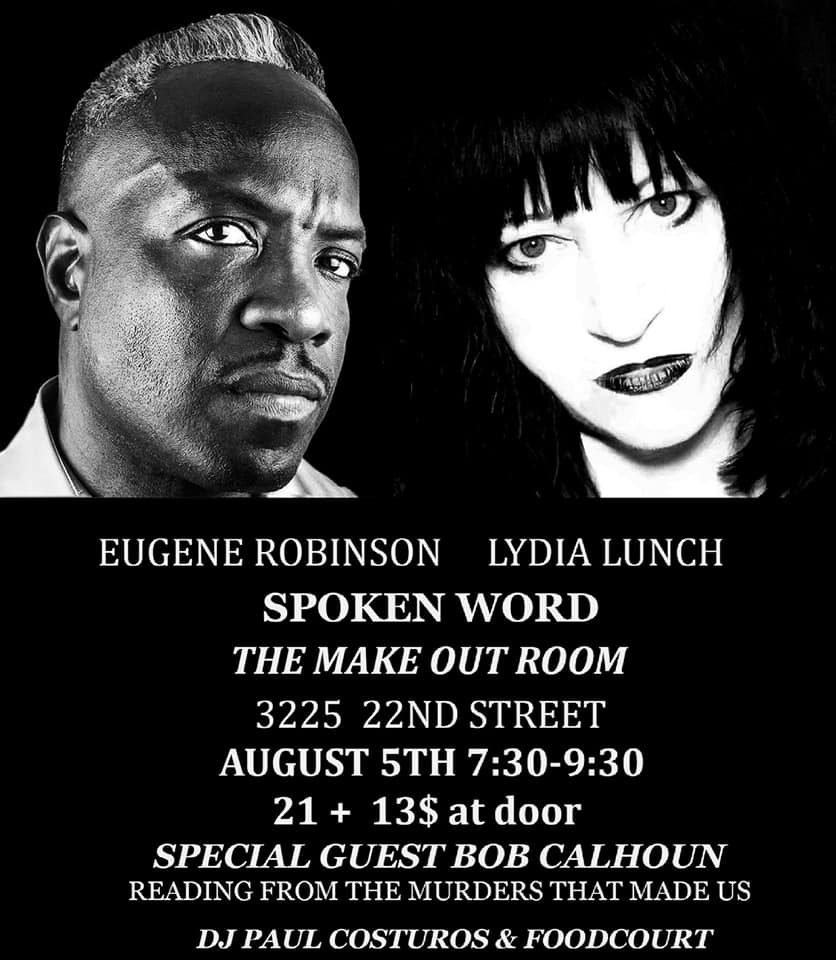
Eugene Robinson is best known as the singer and founding member of Bay Area avant-punk outfit Oxbow. Started in 1988, over the decades the group has gone from clearing rooms with it's squalling, abrasive music and Robinson's disturbing, sometimes confrontational onstage performance to become an acclaimed experimental act that has played festivals on both sides of the Atlantic.
Prior to Oxbow's long reign as one of the Bay Area's preeminent fringe bands, Robinson sang with Peninsula hardcore outfit Whipping Boy, but his credentials as a writer date back to the punk zine he put out while attending college at Stanford in the early '80s called The Birth of Tragedy, that featured interviews with the likes of Allen Ginsburg, Charles Manson and Church of Satan head Anton LaVey.
In addition, Robinson has written two books -- his compelling treatise on fisticuffs Fight: Everything You Ever Wanted to Know About A**-Kicking but Were Afraid You'd Get Your A** Kicked for Asking, in 2007 and the crime novel A Long Slow Screw that was published two years later. He worked for a number of years as an editor and regular contributor to Ozy.com , but recently branched out with his own online subscription newsletter, Look What You Made Me Do.
Writer and punk provocateur Lydia Lunch occupies a similarly broad artistic space. As the guitarist and singer of pioneering NYC noise/no wave band Teenage Jesus and the Jerks -- a group she started with James Chance, who would later form the Contortions and James White and the Blacks -- Lunch was at the epicenter of the city's underground experimental music scene in the late '70s. She would also become the frequent subject of no-wave documentary and avant-garde filmmakers Vivienne Dick and Scott B and Beth B.
Lunch would go on to release a string of solo recordings, collaborating with the likes of Nick Cave and the Birthday Party, LA-based punk band the Weirdos, Swans guitarist Michael Gira and members of Sonic Youth, as well as establishing herself as a writer, poet and an important figure on New York's spoken word and performance art landscape. In addition to this spoken word date, Lunch is appearing at a screening of the new documentary film 'Lydia Lunch: The War Is Never Over' focusing on her life and career directed by Beth B that will be shown at the Roxie Theater on Friday, August 6th. Calhoun recently spoke with CBS SF about the Make-Out Room event and his latest book.
CBS SF: I guess the first question I had was how did this unusual speaking engagement come about with Eugene Robinson and Lydia Lunch?
Bob Calhoun: I've known Eugene since I was in high school, because I went to Menlo Atherton High School and was one of the weird Redwood City kids that had to go to MA. And Whipping Boy, Eugene's hardcore band. they were from Palo Alto.
They kind of became this hardcore psychedelia band at the end. And Niko, who is the guitarist for Oxbow, was in that last iteration of Whipping Boy. They were "our band." When there would be some kind of punk show locally, Whipping Boy was the band who would be main support for, say, the Dead Kennedys down there.
I hated the Red Hot Chili Peppers for a while because Whipping Boy and Eugene got into some tiff with them over something, and it kind of became this rumored story. So we just all decided we didn't like the Chili Peppers and that kind of persisted through their breakthrough hits. So I've known Eugene; I interviewed them for my zine way back when and he just asked me to be on, on the show, you know?
So Eugene and Lydia, they've got their musical side and they write and Eugene has a long association with Lydia. And Lydia is involved in filmmaking. She here the next night at the Roxie with the documentary on her the next night, on August 6th, after our spoken word show on August 5th.
CBS SF: I know you've had a few outdoor, sort of street readings, but this is the first proper reading you're doing that I'm aware of since the book came out last spring...
Bob Calhoun: It's been kind of weird promoting The Murders That Made Us. Only in October am I doing a "Bob Calhoun in Conversation," on Zoom for libraries and bookstores and things. When the book came out, everybody was starting to get vaccinated or had gotten their second shots. So I started having to do those street readings in Washington Square Park in North Beach, and over by the Ferry Building and the Oddities Market in Alameda.
And I kind of went back to performing. It became more of a live performance thing than just a typical book signing. Although I'd done those kind of book readings, from the Lit Quake thing and the stuff I used to do at the Edinburgh Castle way back when. I started having to go back to that kind of performance. It's kind of taken me back to almost Count Dante type stuff.
CBS SF: How have the guerilla reading gone overall. You've been able to at least getting something of a turnout, even in these uncertain times?
Bob Calhoun: Yeah, they've gone surprisingly well. I've only done like two of those, kind of because these other bookings came in. And I hope they continue or I hope we don't go back into total lockdown again. Or need to go back into total lock down again; I mean, if we need to, we need to.
I did those [guerilla readings] for Shattering Conventions where I would just post something on Facebook, like, "Hey, I'll be at Al's Flower Stand at Union Square. And five people would show up. So my whole thing was always if five people show up and they have me sign books and I read and they stand around while I do this, that's cool.
But I've had over 10, which I know sounds really, really small, but the first one had like 20 plus people. And the next one had like around 14 or 15. Like I said, I don't really expect a lot of people to go to these things, so anytime you get over 10 people when you're just announcing stuff on the Internet and you're standing on a street corner somewhere is pretty good.
And I'm also selling out of all the books I have. I'll bring like eight books, 10 books, and I'm still expecting to lug a couple back home, but I'm always running out. Originally it was just like people were buying the books online or buying them at bookstores or they were pre-ordering them. How ever they were doing it, and I was just showing up to sign those books. But I was still selling a lot of books too.
CBS SF: As far the live events, did you find it was mostly people from your extended circle of friends who were coming? Or were there some strangers who just happened to pick up on it from the Internet or maybe just walked over out of curiosity when it started?
Bob Calhoun: It's been more like people brought friends with them. They were brought by people I knew, but then their friends decided they were interested enough in the book to get it. So there have been some people that I totally didn't know who were friends of friends, and then they wanted to buy a book. Or, you know, everybody's got an aunt who wants to read true crime.
There was also another weird thing that's happened. It's like only happened a couple of times, but straight men want to buy the crime book for their wives, but then want to buy the Incredibly Strange Wrestling book Beer, Blood and Cornmeal for themselves. I hope that keeps happening, because I ordered a few more copies of Beer, Blood and Cornmeal, which I wasn't expecting to do,
But yeah, it's been interesting. The Oddities Market in Alameda booked me as live entertainment. Its this kind of goth-y, steam punky thing with artists and selling art and necklaces and jewelry and things. They booked me as live entertainment. just me there reading my crime stories and then selling books. So that was almost all people I didn't know.
And then they booked me again in September. So I have a repeat performance. With that, I skew towards the older crimes in the Victorian era; the 18th and 19th century stuff. Some of those stories tend to be really short and punchy. And also there's little kids running around, so I can't really read about Ed Kemper there, even though there's a lot of people there that probably want to hear about him...
CBS SF: Was the seed of doing a book when you started doing the Yesterdays Crime column for the SF Weekly? Did you kind of think if you're doing a themed column and this is an ongoing thing that's all at least loosely associated with a subject of like crime in San Francisco, did you think from the get-go maybe this could end up being a book? Or did that come later?
Bob Calhoun: No, one of the Weekly editors, Jeremy Lybarger, started me doing this. I had written some kind of true crime or historical stuff and he thought that this would be kind of high-end clickbait for them online. I'd been writing them for a while. But the people I work with worked with in development and fundraising at UC Berkeley, just people in the office, they would read the stories because I would post them on LinkedIn.
I had to stop that, because one of the associate vice chancellors kind of complained to me in the elevator one day; they were like kind of freaking her out and giving her nightmares I guess? But these coworkers of mine, they wanted a collection. They were like, "When are you going to publish a collection?"
And I said, "Well, you could read them all online." But they were willing to part with 20 bucks for better organization and layout. So that was really when I started thinking about it. And once I started thinking of that, then maybe I was like, kind of roughly planning what I'd do. Like, 'Oh, I need to be sure to write about this and that, because it'll fill the chapters in." And I had the idea fairly early on how to organize it once I got away from the idea of an eBooks. Once I thought about actually trying to pitch publishers, I had the idea of a chronology, because I had a lot of stuff from various different times.
I could see the timeline was already forming with what I had. I had stuff from the 21st century and late 20th century, and then I had vigilante stuff and some Zodiac stuff here and '60s and '70s stuff. And then '40s and '30s stuff. So I could see how that would work.
But then I had to plan to fill holes. And even after all of that, when I was trying to bring the book home, there were things I didn't really write about, like Dan White. I kind of never really wanted to write about that. I had written about the White Night riots, but I hadn't written about Dan White. Certain things I had to go into more than I already had. So there are some things that I still didn't get around to writing about, and people on Good Reads will zoom in on those a little bit. But it's also really depressing writing about this stuff after awhile. I was kind of burned out by the time, the final version was sent onto the publisher.
I don't know if you noticed, but a lot of times, like my story about Jim Jones and the People's Temple were actually mostly about these kind of freaky murders of people involved with the People's Temple that happened after Guyana. I mean, I did write about People's Temple before that, but I was always trying to find ways of writing about that stuff -- these kinds of really big, everybody knows about them cases -- by writing about aspects that people didn't necessarily know about.
You always want to avoid giving people what they can get out of Wikipedia. When you write something like this, you're really in competition with that. Like with Richard Ramirez, you just kind of remind people, 'Oh, he was in San Francisco for a while doing heinous, terrible things.' And I would get a lot of people who didn't realize that. He came up here for a while, and then became a statewide story, in a really terrible way.
So I was always trying to find ways of writing about those really well-known cases; I liked finding more obscure things that were totally forgotten. When I was writing the column or working on the book, that was always something that was a little more interesting to me. Just to find some really obscure thing from whenever and just kind of follow all these Chronicle and Examiner and Oakland Trib articles through microfilm or digital archives and reconstruct those.
CBS SF: I was wondering if there was an intimidation factor as far as like getting into topics like the Zodiac Killer or Manson family related stories that have been covered so extensively, but now I get what your approach was without even having to ask that question.
Bob Calhoun: Yeah, with Manson, there were the murders in the Haight during the Summer of Love, the murders of these drug dealers. Manson's kind of brought in there. But when I wrote about the Tate-LaBianca murders, it's really more about Abigail Folger. Because she was murdered at the same time as Sharon Tate, who was this rising star, she kind of gets forgotten. But Abigail Folger gave me a chance to write about the Folger family, who were building that coffee empire during the gold rush in 1850. So I could write about the San Francisco history of that stuff connected to what happened in LA, but I didn't really have to write about that much.
I originally had this idea that Abigail Folger might have been at the Ambassador Hotel when Robert Kennedy was assassinated, because she was doing all this Democratic Party volunteer work with the Tom Bradley campaign and the tragedy of that first Tom Bradley for mayor campaign down there. I thought I might have this big historical sweep of Abigail Folger.
And this was before I even knew about the Quentin Tarantino movie [Once Upon a Time in Hollywood] was, I was writing about that. But in the end, I couldn't find anything conclusive that she was or it wasn't there. That was probably what I was thinking was gonna happen. But if I can find something else that's interesting to try to touch upon in those cases, then that's what I do.
CBS SF: Both Beer, Blood and Cornmeal and Shattering Conventions put you squarely in the center of the action, whether as a memoir or you doing a sort of Gonzo style of experiential journalism. The new book has more of a journalistic and historic approach. I know you've done plenty of writing like that, but was it a big adjustment?
Bob Calhoun: Not so much, because I have written stuff for Salon and I've done plenty of interviews like you're doing with me now. So I've done it. And also, my very first book project was ghost writing the book for "Judo" Gene LaBelle, the stuntman and pro wrestler. So that was my training; writing a first-person book for somebody else.
There was a bit of a challenge because the book begins with like my kind of San Francisco rant then the My Mother the Murder Suspect chapter, which were first person. And then I came back to first person at the end with the Tom Guido stuff. But I really didn't want to put myself into that story any more than I did. So most of it's written as the other stories are written, because I did play the Purple Onion a few times and I talk about that, but I didn't want that to all be about me. I didn't want to get in the way of Tom Guido's story.
But I couldn't not go back to the first person at the end, because it begins with the first person. So it's weird that there's this journalistic narrative that's not first person for most of the book bracketed by first person stuff.
CBS SF: That makes sense in the framing that went with as far as the more personal story and the bookending pieces about San Francisco's dying...
Bob Calhoun: I will say this about that. And maybe I should have written that in the book. You know, when you're out on Valencia Street on a Friday or Saturday night, maybe all these young people have too much money -- they have more money than we had -- but to them, at that moment being drunk on Valencia Street, that's the city to them.
That's this big moment and that's the best the city's ever going to be to them. They're going to talk about whatever terrible venture capital firm they worked at and how much money they were getting and how much cryptocurrency they were mining and how easy it was living in their 300-square-foot apartment that they paid $4,000 a month to live in. That's the moment for them. And we're going to hopefully live to see their terrible books, if people still write books…
CBS SF: No, they'll probably just have a podcast.
Bob Calhoun: Yeah. It'll be podcasts or something more multimedia, to go back and use '90s terms for the world we live in now.
CBS SF: To my knowledge, this is your first foray into true crime. Have you found yourself somewhat absorbed into the genre? Is it something that you see yourself pursuing more, or do you want to find some other sort of subject matter because of the dark and depressing aspect you mentioned?
Bob Calhoun: It would probably be better if I was thinking more about true crime than I am, from a business standpoint. If Murders That Made Us sells well enough, it might someday, five years or 10 years down the road, warrant a revised and expanded edition. There are definitely stories that aren't in there that I would like to be there.
I'd like to clean up the '20s and '30s a bit; I think that part could be better. So there's stuff I'd like to add and fill out. Also some of the Victorian crimes I haven't written about yet are really diabolical, like the woman who had an affair with a married guy and then sent chocolates to the married guy's wife and poisoned her to death from San Francisco when she lived in...Connecticut I think? Or Delaware maybe. There are Victorian crimes in the book, but there could be more. And the Zebra Killers are kind of conspicuous by their absence.
CBS SF: Was there anything that you covered in the book that you could see as a launching point for a deeper investigation or maybe a book on its own? One story that I thought was really fascinating was the Valerie McDonald story...
Bob Calhoun: Yeah, if I was going to do a Netflix series on something; if I was so lucky to be able to produce something like that or find somebody to produce it with me, researching and writing it, that would be the one I would do. Although it's still some kind of freaky stuff, you know? That one guy is in England now, the one guy who's free, and the other guy's in Vacaville. There's a part of me that also thinks with that story I've kicked that hornet's nest about as much as I should kick it.
Sometimes I do think about writing fiction about some scenarios like that, where the true crime writer kind of gets in over his or her head with some of these kind of like, "Oh, they're too old to really be dangerous." But they totally aren't too old to be dangerous. So I think about doing that kind of a fictionalized version.
But Valarie McDonald, it's such a tragic story. And then there's this kind of CIA conspiracy aspect that one of those creeps, I think the one that is in Vacaville, he was like a driver for Nixon, you know? And they have these connections to the UN and to CREEP, the Committee to Reelect the President. I think she should be remembered better than she is. And that's why I worked on the story. She's this tragedy. Eddie Mueller, who knew her, called her San Francisco's Black Dahlia. And in a lot of ways, she is.
CBS SF: I guess one last thing I'll throw in. Do you ever see yourself strapping the old leopard-print kimono and bass back on to resurrect Count Dante for more music or a live performance?
Bob Calhoun: Well, not in the wrestling ring, but I have been looking at bass amps lately. I'm getting too old to lug stacks around, so I'm looking at Orange and Fender 100-watt combo amps that I would have turned my nose up at in my younger days. But now I'm like, "Oh, this is 20 pounds! I could just carry this like heavy luggage!" That might be better than lugging two cabinets and a head around. So the itch is there. I'll just say that. I do want to play again.
I don't know if Count Dante can necessarily come back. My guitarist moved to Colorado, but we do talk about it. We talk about things like, I had this idea for a podcast -- which was not a crime podcast -- and we were talking about recording the theme song like we did for the Shattering Conventions web series. Because if I'm doing any kind of multimedia project, whether it's video or a podcast, the theme song should be me yelling something.
More info:
